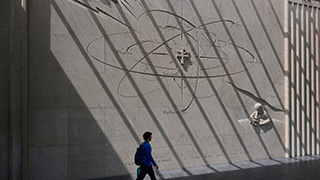Seton Hall University Awarded Nearly $1 Million to Advance Semiconductor Research
Thursday, March 14, 2024
 Seton Hall University will advance its existing research and training capabilities
in the sciences through nearly $1 million in federal funding secured by Representative
Mikie Sherrill (NJ-11), with additional support from Senators Cory Booker and Robert
Menendez.
Seton Hall University will advance its existing research and training capabilities
in the sciences through nearly $1 million in federal funding secured by Representative
Mikie Sherrill (NJ-11), with additional support from Senators Cory Booker and Robert
Menendez.
The $963,000 in funding will enable the University to upgrade its scientific equipment and establish a new applied physics and engineering research and training laboratory with a focus on better understanding the interactions of low-temperature plasmas (LTP) with next-generation semiconductor materials.
Semiconductor devices, also known as microchips, are the foundational electronic components that drive a wide array of electronic devices globally, from computers to smartphones. These new investments will facilitate the collection of new data on LTP-enabled processing and, in turn, enable faculty and students to discover new knowledge about the fabrication of next-generation microelectronics and nanoelectronic devices.
Included in the federal government’s fiscal budget for 2025, the funding will enhance the educational experience of undergraduate and graduate students studying in STEM-designated programs such as physics, chemistry, applied sciences and engineering. Through intentional curriculum improvements, students will be educated and trained on cutting-edge LTP processing equipment and develop sought-after skills and techniques for future careers in this emerging industry.
“Strengthening the innovation economy at our institutions of higher learning is one of the top issues I hear about from local leaders, constituents and businesses,” said Representative Sherrill. “With this Community Project funding, Seton Hall will be able to purchase new scientific research equipment to enhance their training and development of the domestic workforce needed to support the growing semiconductor microchip manufacturing industry.”
Community Projects are submitted by state or local governments, government-adjacent organizations and nonprofits that aim to benefit and improve a local district with federal funding, with Seton Hall University’s funding among fourteen other initiatives.
“Thanks to Congresswoman Sherrill’s advocacy and support, this critical funding will enable Seton Hall to expand and enrich our faculty’s research in plasma science and semiconductor materials. At the same time, students will gain new opportunities for scientific research and first-hand, experiential learning to prepare them for careers in this growing field,” said Katia Passerini, Ph.D., interim president of Seton Hall.
With a combined focus on research, development and workforce preparation for advanced semiconductor manufacturing, this project aligns with the national focus to bolster onshore domestic manufacturing of semiconductors, as articulated in the CHIPS and Science Act of 2022.
According to a 2023 report by McKinsey & Company, demand for domestic semiconductor fabrication plants grows annually, with the value of U.S.-based projects totaling $223 billion and more than $260 billion by 2030. This funding positions Seton Hall students to be at the forefront of global trends and immense career opportunities.
“This significant investment enables Seton Hall University to contribute and lead invaluable scientific research that will support technological innovation and developments in the semiconductor fabrication industry, all while providing our students access to state-of-the-art resources in use industry-wide,” noted Jose Lopez, Ph.D., director of the Office of Grants and Research Services and professor of physics.
Additionally, the funding will also improve the existing investigative capabilities of the University’s Advanced Materials Synthesis and Characterization Laboratory, led by Distinguished Fulbright Scholar and Professor Mehmet Alper Sahiner, Ph.D. and the Laboratory of Electrophysics and Atmospheric Plasmas (LEAP), led by Lopez.
Seton Hall recently launched an M.S. in Applied Physics and Engineering that educates students in these and other cutting-edge laboratories working on materials science, microbiology, renewable energy, engineering and other important fields.
Categories: Research, Science and Technology
